
Browse an alphabetical list of survivors’ oral histories. These interviews describe firsthand accounts and personal experiences during the Holocaust and World War II.
<< Previous | Displaying results 281-290 of 572 for "Oral History" | Next >>
John, who was born to a non-Jewish Polish family, graduated from an art academy. Following the German invasion of Poland on September 1, 1939, John was in Krakow. Food became scarce in Krakow, with long lines of people waiting for whatever food was available. John decided to join the resistance against the Germans. By early 1940, he and two of his friends felt that they were in danger and decided to try to escape to France. John was caught and arrested during this escape attempt. He survived imprisonment…
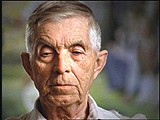
John, who was born to a non-Jewish Polish family, graduated from an art academy. Following the German invasion of Poland on September 1, 1939, John was in Krakow. Food became scarce in Krakow, with long lines of people waiting for whatever food was available. John decided to join the resistance against the Germans. By early 1940, he and two of his friends felt that they were in danger and decided to try to escape to France. John was caught and arrested during this escape attempt. He survived imprisonment…
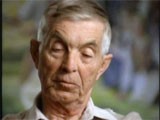
In 1936, John Woodruff was one of 18 African Americans on the US Olympic team competing in Berlin. He won the gold medal for the men's 800-meter race. In this clip he describes his feelings upon winning the medal. Interview date: May 15, 1996
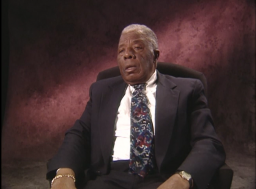
Joseph immigrated to the United States in 1933 after finishing university in Leipzig. His parents and brother had left Germany earlier for the United States. Joseph attended Columbia University. From 1940 to 1943 he was assistant editor for a New York German-Jewish newspaper. In 1944, he worked in the American embassy in Britain as a propaganda analyst. He went to Nuremberg, Germany, as an interpreter in 1946. He analyzed materials and transcripts, and participated in many interrogations for the Nuremberg…
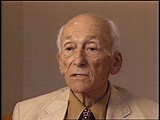
Joseph immigrated to the United States in 1933 after finishing university in Leipzig. His parents and brother had left Germany earlier for the United States. Joseph attended Columbia University. From 1940 to 1943 he was assistant editor for a New York German-Jewish newspaper. In 1944, he worked in the American embassy in Britain as a propaganda analyst. He went to Nuremberg, Germany, as an interpreter in 1946. He analyzed materials and transcripts, and participated in many interrogations for the Nuremberg…
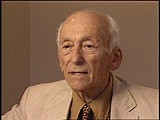
Joseph immigrated to the United States in 1933 after finishing university in Leipzig. His parents and brother had left Germany earlier for the United States. Joseph attended Columbia University. From 1940 to 1943 he was assistant editor for a New York German-Jewish newspaper. In 1944, he worked in the American embassy in Britain as a propaganda analyst. He went to Nuremberg, Germany, as an interpreter in 1946. He analyzed materials and transcripts, and participated in many interrogations for the Nuremberg…
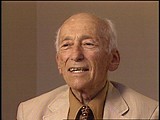
Joseph and his family were Roman Catholics. After Germany invaded Poland in 1939, roundups of Poles for forced labor in Germany began. Joseph escaped arrest twice but the third time, in 1941, he was deported to a forced-labor camp in Hannover, Germany. For over four years he was forced to work on the construction of concrete air raid shelters. Upon liberation by US forces in 1945, the forced-labor camp was transformed into a displaced persons camp. Joseph stayed there until he got a visa to enter the…
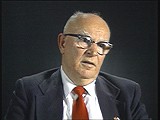
Joseph and his family were Roman Catholics. After Germany invaded Poland in 1939, roundups of Poles for forced labor in Germany began. Joseph escaped arrest twice but the third time, in 1941, he was deported to a forced-labor camp in Hannover, Germany. For over four years he was forced to work on the construction of concrete air raid shelters. Upon liberation by US forces in 1945, the forced-labor camp was transformed into a displaced persons camp. Joseph stayed there until he got a visa to enter the…
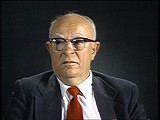
Joseph and his family were Roman Catholics. After Germany invaded Poland in 1939, roundups of Poles for forced labor in Germany began. Joseph escaped arrest twice but the third time, in 1941, he was deported to a forced-labor camp in Hannover, Germany. For over four years he was forced to work on the construction of concrete air raid shelters. Upon liberation by US forces in 1945, the forced-labor camp was transformed into a displaced persons camp. Joseph stayed there until he got a visa to enter the…
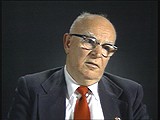
Upon her father's death, Judith and her family moved to Kovno. Soon, they were confined to the ghetto, which the Germans formed in 1941. Judith, her mother and sister were deported to Stutthof, where her mother died. Judith and her sister escaped from a death march out of Stutthof. They posed as non-Jews, found farm work and eventual refuge in Denmark. Their brother survived Dachau.
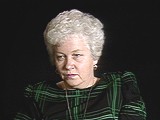
We would like to thank Crown Family Philanthropies, Abe and Ida Cooper Foundation, the Claims Conference, EVZ, and BMF for supporting the ongoing work to create content and resources for the Holocaust Encyclopedia. View the list of donor acknowledgement.